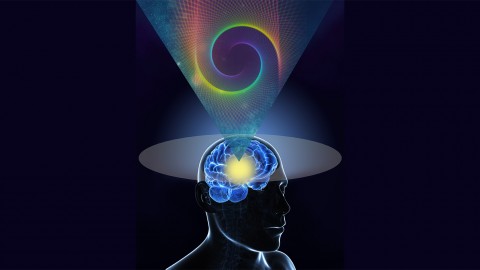BEING BOUND TOGETHER AS CAUSE-EFFECT, THE EFFECTS DISAPPEAR WITH THE DISAPPEARANCE OF CAUSES.
Avidya, ignorance of one’s own being, is the basic cause of the world. Once avidya, the ignorance of one’s own being, disappears, the world also disappears – not the world of objects, but the world of desires; not the world that is outside you, but the world that you have been constantly projecting from the inside. The world of your dreams, illusions, projections, immediately disappears the moment ignorance disappears within you.
This has to be understood: ignorance is not simply lack of knowledge so you can go on gathering knowledge but ignorance will not disappear that way. You can become very knowledgeable, but still you will remain ignorant. In fact, knowledge functions as a protection for ignorance. Ignorance is not destroyed by knowledge. On the contrary, it is protected by it. The urge to collect knowledge, accumulate knowledge, is nothing but to hide one’s own ignorance. The more you know, the more you think that now you are no longer ignorant.
There is a saying in Tibet: Blessed are they who are ignorant, for they are happy in thinking that they know everything.
Trying to know everything is not going to help; it is missing the whole point. Trying to know one’s self is enough. If you can know your own being you have known all because you participate with the whole, your nature is of the whole.
You are just like a drop of water. If you know the drop-of water totally, you have known all the oceans, past, present and future. In a single drop of water the whole nature of the ocean is present.
A man who is after knowledge continuously forgets himself and goes on accumulating information.
He may come to know much, but still he will remain ignorant. So ignorance is not against knowledge; knowledge is not the antidote for ignorance. Then what is the antidote for ignorance? Yoga says: awareness; not knowledge, but knowing; not focusing yourself outside, but focusing on the very faculty of knowing.
When a child is in the mother’s womb, he is completely asleep. The first months in the mother’s womb are of deep sleep, what yoga calls sushupti – sleep without any dreams. Then, by the end of the sixth or seventh month, the child starts dreaming a little. The sleep is disturbed; it is no more absolute. Something happens outside, a noise, and the child’s sleep is disturbed. Vibrations reach him, and in his deep sleep a distraction arrives and he starts dreaming. The first ripples of dream arise. Dreamless sleep is the first state of consciousness.
The second state is: sleep plus dream. In the second state sleep remains, but a new faculty starts functioning: the faculty of dreaming. Then, when the child is born a third faculty arises, what we ordinarily call the state of waking. It is not really the state of waking, but a new faculty starts functioning and that faculty is of thought. The child starts thinking.
The first state was dreamless sleep: the second state was sleep plus dreaming; the third state is sleep, plus dreaming, plus thinking, but sleep still remains. Sleep has not been completely broken.
You remain asleep in your thinking also. Your thinking is nothing but another way of dreaming; sleep is not disturbed. These are the ordinary states. Rarely does a man reach higher than this third stage of thinking. And that is the goal of yoga: to reach a state of pure awareness, as pure as the first state is. The first state is of pure sleep, and the last state is of pure awakening, pure awareness. Once your awareness is as pure as your deep sleep, you have become a Buddha, you have attained, you have come home.
Patanjali says: samadhi, the ultimate state of awareness, is just like sleep, with one difference. It is as calm and quiet as sleep, as silent, undisturbed as sleep, as integrated and blissful as sleep, with one difference: it is fully alert. These are the points of evolution. Ordinarily, we remain at the third.
Deep down sleep continues, on top of it a layer of dreaming, on top of it another layer of thinking – but the sleep is not broken. And you can observe it; it is not a theory. You can observe the facticity of it.
At any moment you close your eyes, first you will see thoughts, a layer of thinking all around you, thoughts vibrating – one coming, another going – a crowd, a traffic. Remain silent for a few seconds, and suddenly you will see that thinking is no longer there but dreaming has started. You are dreaming that you have become the president of a country, or you have found a brick of gold on the road, or you have found a beautiful woman or a man, and suddenly you start projecting; dreams start functioning. If you continue dreaming for a long time, one moment will come when you will fall asleep – thinking, dreaming, sleep, and from sleep again to dreaming and thinking. This is how your whole life revolves. Real awareness is not known yet, and that real awareness is what Patanjali says will destroy ignorance – not knowledge, but awareness. We collect knowledge just to befool ourselves and others.
I have heard: In a small school it happened that a school inspector said to the class, “Who knocked down the walls of Jericho?” And one of the pupils, a lad called Billy Green, replied promptly, “Please sir, it was not me.” The inspector was amazed at this show of ignorance and brought the matter up in the headmaster’s study at the end of the visit. “Do you know,” he said, “I asked the class, ‘Who knocked. down the walls of Jericho,’ and young Billy Green said it was not him!” The headmaster said, “Billy Green? Oh well… I must say that I have always found the lad to be honest and trustworthy, and if he says that it was not him, then it was not him.”
The inspector left the school without further comment, but lost no time in reporting the full sequence of events to the Ministry of Education in a written report. In due course, he received the following reply: “Dear sir, Reference: The Walls of Jericho; this is a matter for the Ministry of Works, and your letter has been sent to them for their attention.”
But nobody wants to recognize a simple fact that they don’t know. Everybody tries; whatsoever the question, everybody tries the answer. You should catch yourself red-handed many times if you try. Somebody asks something, somebody talks about something you don’t know, but you start commenting, advising, saying something or other so that you are not caught ignorant, so nobody thinks that you are ignorant. But the first beginning of awareness starts with the recognition that you are ignorant. Ignorance can be destroyed, but not without recognizing it.
When P. D. Ouspensky, the great disciple of George Gurdjieff, met his Master for the first time, he was already a very famous, well known man in the world. Gurdjieff was unknown, Ouspensky was known very much already. He had already written one of the best books written in this century, TERTIUM ORGANUM. It is really a bold attempt. In fact, in this century no other man has tried such a bold speculation. With courage, Ouspensky has described his book as the third canon of thought: TERTIUM ORGANUM. The first was written by Aristotle; the second was written by Bacon. And he said, “I write the third canon of thought.” He said, “The first and the second are nothing before the third. The third existed before the first.” It was really a bold attempt, and not just egoistic. The claim was almost true.
When Ouspensky went to Gurdjieff, Gurdjieff looked at him. He could see the knowledgeable man who knew much, who knew that others also knew that he knew much – the subtle ego. Gurdjieff gave him a paper, a sheet of paper, and told him to go to a room on the side and write down on one side whatsoever he knew, and on the other side whatsoever he did not know. Because the work could start only when he was clear about what he knew and what he did not know. Gurdjieff said, “Remember, whatsoever you write that you know, I will accept, and we will never talk about it again. It is finished; you know. Whatsoever you write that you don’t know, we will work on it.” And the first thing Gurdjieff said was to know what you know and what you don’t know.
Ouspensky went into the room. He started thinking of what he knew for the first time in his life, and he could not write a single thing on the paper. He tried God, self, the world, mind, awareness – what did he know? For the first time the question was asked authentically. He knew many things about God, and he knew many things about the soul, and he knew many things about awareness, but he did not really know a thing about God. It was all information; it was not his experience. And unless something is your experience how can you say you know it?
You may know about love, but that is not knowledge really. You have to pass through love, you have to pass through the fire of love. You have to burn, you have to survive the challenge, and when you come out of love you are totally different, different from the man who had gone in. Love transforms.
Information never transforms you. Information goes on becoming an addition: whatsoever you are, it goes on adding to it. It becomes like a treasure to you but you remain the same. Experience changes you. Real knowledge is not an accumulation, it is a transformation, a mutation – the old dies and the new is born. It is hard….
Ouspensky tried as hard as possible to find at least a few things, because it was so much against his ego not to write anything. He could not even write, “I know myself.” If you have not known the basic entity, yourself, then what else can you know? It was a cold night and he started perspiring. Just a moment before he was shivering with cold. His whole being was at stake. He started feeling dizzy, as if he would fall into a swoon or a fit. Long hours passed, then Gurdjieff knocked at the door and said, “Have you done anything?” And Gurdjieff could see that the man had changed. Just keeping that blank sheet of paper in his hand, sitting there – it had been a great meditation, a zazen. He gave the empty, blank paper to Gurdjieff and said, “I don’t know anything. I am absolutely ignorant. Accept me as your disciple.”
Gurdjieff said, “You are ready then… to recognize that one is ignorant is the first step towards wisdom.”
Tags: Patanjali Yoga Sutra 48 Real Awareness










